

A huge radio hit in America, it pushed the Demons and Wizards album to number 23 on the Billboard 200 album chart. Though it failed to chart in the UK, the song, a tongue-in-cheek reflection upon outsider perceptions of the band’s lifestyle, the song became a top 20 hit across mainland Europe, and peaked on the Billboard Hot 100 at number 39. Hensley wrote the band’s biggest hit, “Easy Livin’” from 1972’s Demons And Wizards album, in just 15 minutes. “I saw a lot of potential in the group to do something very different,” remembered Hensley, who wrote or co-wrote the majority of Uriah Heep’s songs until his departure from the band in 1980, including the hit singles “Easy Livin’”, “Stealin’”, “Lady In Black” and “Free Me.” “I was a big Vanilla Fudge fan, with their Hammond organ and searing guitar on top, and we had David’s high vibrato vocals anyway so that’s how we decided to shape it.” Songwriter-in-chief “We’d actually recorded half the first album when we decided that keyboards would be good for our sound,” Mick Box once recalled. Shortly afterwards, the Londoners changed the group’s name to Uriah Heep, recording their first two albums, …Very ‘Eavy, Very ‘Umble and Salisbury for Vertigo before switching to Warner Brothers for later releases. Hensley joined guitarist Mick Box and vocalist David Byron in the band Spice in February 1970. The group also released the album Orgasm under the pseudonym Head Machine. Stay safe out there.” One of the Godsīorn Kenneth William David Hensley on August 24, 1945, the keyboard player first attracted the spotlight as a member of The Gods, who featured future Rolling Stones guitarist Mick Taylor, and recorded two albums, 1968’s Genesis and 1969’s To Samuel A Son, for Columbia Records.
.jpg)

“Ken has gone but he will never be forgotten and will always be in our hearts.


 0 kommentar(er)
0 kommentar(er)
